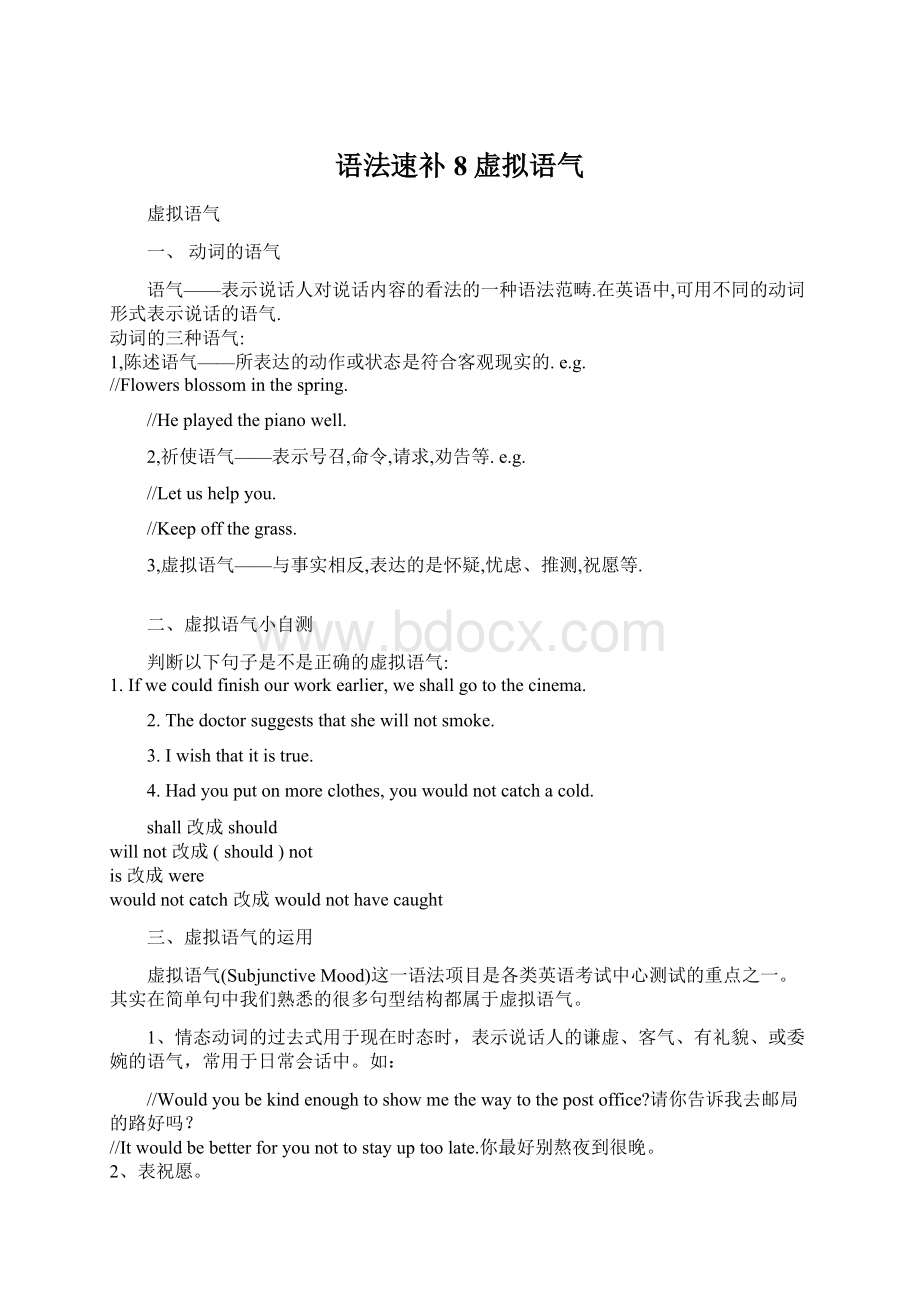语法速补8虚拟语气.docx
《语法速补8虚拟语气.docx》由会员分享,可在线阅读,更多相关《语法速补8虚拟语气.docx(8页珍藏版)》请在冰豆网上搜索。

语法速补8虚拟语气
虚拟语气
一、动词的语气
语气——表示说话人对说话内容的看法的一种语法范畴.在英语中,可用不同的动词形式表示说话的语气.
动词的三种语气:
1,陈述语气——所表达的动作或状态是符合客观现实的.e.g.
//Flowersblossominthespring.
//Heplayedthepianowell.
2,祈使语气——表示号召,命令,请求,劝告等.e.g.
//Letushelpyou.
//Keepoffthegrass.
3,虚拟语气——与事实相反,表达的是怀疑,忧虑、推测,祝愿等.
二、虚拟语气小自测
判断以下句子是不是正确的虚拟语气:
1.Ifwecouldfinishourworkearlier,weshallgotothecinema.
2.Thedoctorsuggeststhatshewillnotsmoke.
3.Iwishthatitistrue.
4.Hadyouputonmoreclothes,youwouldnotcatchacold.
shall改成should
willnot改成(should)not
is改成were
wouldnotcatch改成wouldnothavecaught
三、虚拟语气的运用
虚拟语气(SubjunctiveMood)这一语法项目是各类英语考试中心测试的重点之一。
其实在简单句中我们熟悉的很多句型结构都属于虚拟语气。
1、情态动词的过去式用于现在时态时,表示说话人的谦虚、客气、有礼貌、或委婉的语气,常用于日常会话中。
如:
//Would you be kind enough to show me the way to the post office?
请你告诉我去邮局的路好吗?
//It would be better for you not to stay up too late.你最好别熬夜到很晚。
2、表祝愿。
1)常用“may+动词原形”表示祝愿,但愿,此时may须置于句首(多用于正式文体中)。
//May good luck be yours!
祝你好运!
//May you be happy!
祝你快乐!
//May you do even better!
祝你取得更大成就!
//May you have a good time. 祝愿你玩的痛快。
//May the friendship between us last long. 祝愿我们的友情天长地久。
//May you be happy. (注意那个be ) 祝你幸福。
2)用动词原形。
例如:
//Long live the people!
人民万岁!
//“God bless you,”said the priest.牧师说:
“愿上帝保佑你!
”
//Have a good journey!
祝愿你旅途愉快!
3、表示强烈愿望。
(该类型虚拟语气谓语仅用动词原形,第三人称单数也不加“s”)
//God save me.
//Heaven help us.
4、表命令
1)命令虚拟语气只能用在第二人称(you),而且通常省略主语(也就是you)。
2)句子尾通常加上感叹号:
!
3)虚拟语气动词用一般现在时态(Simple Present),如:
work, be , go
4)否定形式的命令语气,可用助动词do,加上not。
// Work !
//Work harder !
//Be more alert !
(虚拟语气动词Be)
// You go out !
//Do not work so hard. (do not 表示否定的虚拟语气)
//Don't be afraid. (口语中常用don't 代替do not)
5、在一些习惯表达中。
如:
//You’d better set off now.你最好现在就出发。
//I’d rather not tell you the secret.我情愿不告诉你这个秘密。
虚拟语气是一种特殊的动词形式,用来表示说话人所说的话并不是事实,而是一种假设、愿望、怀疑或推测。
在从句中的用法有多种情况:
Ⅰ用以表示虚拟条件的虚拟语气
⒈用if条件从句表示的虚拟条件,是虚拟条件最普通的方式。
1虚拟现在时表示与现在事实相反的假设,
if从句的谓语形式用动词的过去式(be一般用were);
主句用would/should/could/might+动词原形。
例如:
IfIwereinyourpositionIwouldmarryher.
2虚拟过去时是表示与过去事实相反的假设,
if从句的谓语形式用过去完成时即had+过去分词;
主句用would/should/could/might+have+过去分词。
例如:
Ifithadnotrainedsohardyesterdaywecouldhaveplayedtennis.
③大多数的虚拟条件句属于上面的一种,但并不排除存在条件和后果中,一个和现在情况相反,另一个和过去情况相反,例如:
Ifyouhadfollowedwhatthedoctorsaid,youwouldnothavebeensopainfulnow.
④但是,如果后果用了虚拟语气,而条件却用陈述语气,这种用法是错的。
⒉除了表示虚假条件外,if从句还可以表示对将来的推测,由于是将来还没有发生的,所以谈不上是真实的还是虚假的,只能说这个事情发生的可能性有多大。
一般情况下,可以用陈述语气的if从句来表示对一个未来事实的推测,这个事实是完全可能发生的。
If从句的谓语形式用一般过去式或用wereto/should+动词原形;
主句用would/should/could/might+动词原形。
例如:
Jeandoesn'twanttoworkrightawaybecauseshethinksthatifsheweretogetajobsheprobablywouldn'tbeabletoseeherfriendsveryoften.
⒊有时可以把含有助动词、情态动词、be或have的虚拟条件句中的连词if省去,而将had,should,were等词提到主语之前,即用倒装结构,这时候,如果出现not等否定词,否定词需放在主语后面。
这种结构在口语中很少使用,但频频出现在各类考试中出现,例如:
Ifithadnotrainedsohardyesterdaywecouldhaveplayedtennis.→Haditnotrainedsohardyesterday,wecouldhaveplayedtennis.
⒋大多数的虚拟条件通过上面所讲的方法表达,但在个别句子中也可以通过介词without和介词短语butfor表达,副词otherwise等表达出来。
例如:
Wedidn'tknowhistelephonenumber;otherwisewewouldhavetelephonedhim.值得注意的是,包含butfor的句子,谓语动词必定要用虚拟形式,但包含without等短语的句子,谓语动词未必一定要用虚拟语气。
⒌有时虚拟条件不是明确地表达出来,而在蕴含在用but引导的从句里,于是便出现了有谓语动词是虚拟语气的主句加上谓语动词是陈述语气的but从句构成的并列复合句,例如Iwouldhavehungyoubutthetelephonewasoutoforder.在这样的句子里,如果主句没有用虚拟语气,或者从句用了虚拟语气,都是错的。
Ⅱ用在宾语从句中的虚拟语气
1.在表示愿望的动词wish后的宾语从句中,需用虚拟语气。
(wish后的that常省略),根据主句时态,从句谓语时态相应退后一位,例如:
Howshewishedhisfamilycouldgowithhim.
(1)对现在情况的虚拟(与现在的事实相反):
从句用过去式或过去进行式(时间上是同时的)。
其句子结构为:
宾语从句的谓语be用were,实义动词用过去式。
//I wish I knew the answer to the question.(wish, 动词过去式knew)我希望知道这个答案。
(事实上是不知道)
//I wish it were spring in my hometown all the year around.(wish, were)但愿我的家乡四季如春。
(事实上不可能)
//I wish I were a bird.(wish, were)但愿我是只小鸟。
(事实上不可能)
// When she was at the party,she wished she were at home.(wished,过去虚拟动词were)(事实上并不在家)
//Now that he is in China, he wishes he understood Chinese.(wishes,过去虚拟动词understood) 现在他在中国,他希望能懂得中文。
(事实上并不懂)
// When we begin the trip, they will wish they were with us.(will wish,过去虚拟动词were)(事实上并不和我们在一起)
(2)对过去情况的虚拟(和过去的事实相反):
用wish表示对过去事情的遗憾。
其句子结构为:
宾语从句的谓语用过去完成时,或would, could, might+现在完成时。
//I wish (that可省略,下同)I hadn't wasted so much time. 我后悔不该浪费这么多时间。
(事实上已浪费了)
// He wishes he hadn't lost the chance. 他真希望没有失去机会。
(其实已失去)
// We wished he had spoken to us. (wished,had + spoken)(事实上他并没同我们讲)
//I wish you had called earlier. (wish, had + called)(事实上已迟了)
// They will wish they had listened to us sooner. (will wish,had + listened)(事实上并不如此)
(3)对将来情况的虚拟(表示将来的主观愿望):
用wish表示对将来事情的愿望。
从句动词"would/should/could/might + 动词原形"(时间上较后)(请注意:
主句和从句的主语不相同)。
//I wish it would stop raining.(虚拟动词would+动词原形stop) 我希望雨能停止。
(事实上雨还在下着呢)
//I wish you would be quiet.(would + be) 我希望你安静一些。
(事实上那家伙还在吵着呢)
//You wished she would arrive the next day.(would + arrive) 你希望她第二天会到。
(事实上她还没到)
//I wish she would change her mind.(would + change) 我希望她会改变主意。
(呵呵,女孩子可没那么容易就改变主意喔)
// He will wish we would join him the following week.(would + join) (只是希望我们和他在一起,实际上还没在一起)
(4)注意:
如果将wish改为过去式wished, 其后that 从句中的动词形式不变。
例如:
//I wished I hadn't spent so much money. 我要是那时没有花掉那么多钱就好了。
如果that 从句中用would , 一般表示对现状不满或希望未来有所改变或请求:
//I wish he would answer my letter.
//I wish prices would come down.
//I wish you would help me.
//I wish you would stop asking silly questions.
2.在具有愿望、请求、建议、命令、忠告等主观意愿的动词(desire,demand,advice,insist,require,suggest,propose,order,recommend,decide…)后的宾语从句中需用虚拟语气。
谓语动词用(should)+动词原形。
Should常省略
例如:
//The doctor suggested that he (should) try to lose his weight.
//He insisted that we (should ) tell him the news.
//When I suggested that he try shaving cream, he said, “The razor and water do the job. ”(当我建议他用刮胡膏时,他说“剃刀和水就行了”。
)
//He pursued various theories for several days until I suggested we take the toy apart to see how it did work. (他费了几天功夫寻找理论根据,直到我建议拆开看看它是如何转动的。
)
//One can suggest that students should spend two or three years in an Englishspeaking country. (我们建议学生应在说英语的国家呆上两三年。
)
//I suggest that we (should) hold a meeting next week.
//He insisted that he (should ) be sent there.
值得注意的是:
如果宾语从句的动词是否定的,否定词not的位置应在动词之前,而不是动词之后。
例如:
Theheadnurseinsistedthatthepatientnotbemoved.
另外:
如suggest表达“暗示”,insist表示“坚持某种说法”时,后面的从句不用虚拟语气,例如:
Herpalefacesuggeststhatsheisill.或Heinsistedthathedidnotkilltheboy.
【这里其实是:
在insist 后的从句中, 如果是坚持自己, 用陈述语气, 坚持别人做什么事情, 用虚拟语气。
比较
//she insists that she is right.
//she insisted that I should finish the work at once. 】
除此之外,上述动词的其他形式也要求用虚拟式:
①在Itis+上述动词的过去分词,其后所跟的主语从句中,如Itissuggestedthatpupilswearschooluniforms.
②在上述动词相应的名词形式作主语+连系动词,其后的表语从句中,例如Hissuggestionwasthatclassesbere-scheduled.
③在对上述动词相应的名词进行解释的同位语从句中,如:
Theworkersraisedthedemandthattheirpaybeincreasedtocopewiththeinflation.
3.在expect, believe, think, suspect等动词的否定或疑问形式后的宾语从句中,我们经常用
“should+动词原形(或完成形式)”
表示惊奇,怀疑,不满等。
//I never thought that he should be such a brave young soldier. 我们从来没想到他是个如此勇敢的小战士。
4.would rather , would sooner, had rather, would (just) as soon,would prefer(希望)也用来表达主观愿望,它们之后的宾语从句中需用虚拟语气。
谓语动词用过去式表示现在或将来;
用过去完成式表示与过去事实相反。
//Iwouldratherhewentrightnow.
//I would rather he came tomorrow than today.
//John would rather that she had not gone to the party yesterday evening.
//Don' t live in the world, I would rather( I would just as soon) you die.
//I would rather you go tomorrow.
//I would rather everything hadn' t happened in the past.
//The manager would rather his daughter did not work in the same office.经理宁愿她女儿不与他在同一间办公室工作。
//To be frank,I'd rather you were not involved in the case.坦率地说,我希望你不要卷入这件事。
//You don't have to be in such a hurry.I would rather you went on business first.你没有必要这么着急,我宁愿你先去上班。
//I'd rather you didn't make any comment on the issue for the time being.我倒希望你暂时先不要就此事发表意见。
//Frankly speaking ,I‘d rather you didn't do anything about it for the time being.坦白地说,我宁愿你现在对此事什么也不要做。
//Wouldn't you rather your child went to bed early?
为什么你不愿让你的孩子早点上床呢?
//I would just as soon you had returned the book yesterday.我真希望你昨天把这本书还了。
注:
1若某人愿自己做某事,would rather后用动词原形
//I would rather stay at home today.
2would rather...than...中用动词原形
//I would rather stay at home than go out today.
5.“had hoped”后的宾语从句中的虚拟语气 ,用“于表示原来希望做到而实际上未能实现的事情,其宾语从句的谓语用
“would+动词原形”。
//I had hoped that she would go to the U.S. and study there, but she said she liked to stay in China.我原本希望她到美国去念书,但她说她喜欢留在中国。
Ⅲ其他形式的虚拟语气
1.itis+necessary等形容词后,that主语从句中虚拟形式使用,这类形容词包括necessary,important,essential,imperative,urgent,preferable,vital,advisable等,例如Itisnecessarythatyoulistentotheteachercarefully.或者Itisessentialthatyoubeabletopronounceeverysinglewordcorrectly.
2.在It's(high/about)time之后的定语从句中需用虚拟语气。
谓语动词用过去式,例如Itishightimethatyouwenttoschool
3.虚拟语气在asif/asthough引导的方式状语从句中的应用(谓语动词形式与wish后的宾语从句基本相同)表示与现在事实相反或对现在情况有怀疑,谓语动词用过去式。
例如:
Hefeltasifhealonewereresponsibleforwhathadhappened.表示过去想象中的动作或情况,谓语动词用过去完成式。
4.在lest引导的状语从句中,谓语动词多用虚拟语气,(should)+动词原形。
例如:
Themadmanwasputinthesoft-paddedcelllestheinjurehimself.
5.在ifonly引起的感叹句中需用虚拟语气。
谓语动词用过去式或过去完成式。
例如:
LookattheterriblesituationIamin!
ifonlyIhadfollowedyouradvice.